Can a Divorce Agreement Be Modified in Illinois?
 Post-decree divorce modifications are relatively common as they relate to child custody and child support issues. Children’s needs change with time and the circumstances of the parents can change as well. These changes can require modifying a previous agreement. Marital settlement agreement modifications that pertain to the division of assets and spousal support are much less common and are only allowed under specific circumstances.
Post-decree divorce modifications are relatively common as they relate to child custody and child support issues. Children’s needs change with time and the circumstances of the parents can change as well. These changes can require modifying a previous agreement. Marital settlement agreement modifications that pertain to the division of assets and spousal support are much less common and are only allowed under specific circumstances.
In addition to a divorce decree modification, it may also be necessary to enforce the marital settlement agreement when one spouse does not abide by it. Should you find yourself in need of a marital settlement agreement modification, it is essential that you speak to an experienced Lombard, IL divorce modification attorney from Mevorah & Giglio Law Offices.
What Is a Marital Settlement Agreement?
When a couple divorces, a written contract outlining the terms of the divorce is prepared. Once signed by the spouses and the judge, it becomes binding and enforceable. If one spouse ignores the agreement terms, the other can ask the court to enforce them. Marital settlement agreements generally outline asset division, child custody and visitation, spousal support, and child support.
Spouses can decide all these issues on their own and submit a marital settlement agreement that details their decisions. If the judge signs off on the agreement, it becomes legal and binding. Sometimes, a judge has to decide at least some of the details that will end up in the final divorce decree.
What Are the Reasons a Divorce Decree Can Be Modified?
In addition to changes in the circumstances of parents and children, fraud is one of the few reasons a spouse may ask the court for a divorce decree modification. If it becomes clear after the agreement is signed that one of the spouses was hiding assets or income or submitted falsified financial documents, the court may grant a modification request. A request for a financial modification based on fraud is rare and must be made within 30 days of the divorce decree becoming final.
Other issues that can potentially support the modification of a divorce decree (largely as they pertain to spousal support and generally only to decrease the amount of spousal support) include:
-
The paying party develops a disabling condition that prevents him or her from working.
-
The receiving party receives a substantial personal injury settlement or inheritance.
While a significant increase in the receiving spouse’s financial situation could potentially justify decreasing spousal support payments, it is almost never used to increase payments. An increase would only occur if the initial support order was lower than normal because the paying spouse was unemployed or ill at the time of the order. To recap, asset division orders may be appealed, but it is rare, spousal support is usually only decreased, rarely increased, and marriage or cohabitation are by far the most common reasons for spousal support to be terminated.
How Are Violations of a Divorce Decree Addressed?
If one party fails to meet the financial obligations set forth in the divorce decree, there are mechanisms for enforcement. The person claiming their ex breached the agreement must provide sufficient evidence to prove that claim. A motion for enforcement can be filed with the court describing the violations. The court can then modify the original agreement, which can include taking away the rights or privileges of the party violating the agreement. Fines can also be issued, and the violating party can be required to pay the other’s attorney fees.
Contact a DuPage County, IL Divorce Decree Modification Attorney
While we all want to believe that once a divorce is over, it is really over, many times, this is not the case, particularly for divorcing couples with children. As lives change and children grow, modification to those issues can occur. Regardless of the type of modification, these changes to the original divorce agreement can get messy and contentious.
Having an experienced Bloomingdale, IL divorce decree modification lawyer from Mevorah & Giglio Law Offices by your side can make a significant difference in how these issues are resolved. When you choose Mevorah & Giglio Law Offices, you will garner the benefits of a large law firm with more than 175 years of combined experience. Our firm is highly client-focused and we are proud of the level of communication we have with each client. Call 630-932-9100 to schedule your free consultation.
 English,
English,
 Spanish,
Spanish,
 Polish,
Polish,
 Urdu
Urdu













 Make a Payment
Make a Payment



